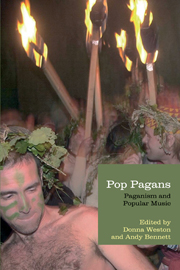Book contents
- Frontmatter
- Contents
- Contributors
- Foreword
- 1 Towards a definition of Pagan music
- Part I Histories
- Part II Genres
- Part III Performance
- Part IV Communities
- 11 Sacramental song: theological imagination in the religious music of American Pagans
- 12 The rise of the Celtic cyber-diaspora: the influence of the “New Age” on internet Pagan communities and the dissemination of “Celtic” music
- 13 Esoterrorism and the wrecking of civilization: Genesis P-Orridge and the rise of industrial Paganism
- Bibliography
- Discography and filmography
- Index
11 - Sacramental song: theological imagination in the religious music of American Pagans
from Part IV - Communities
- Frontmatter
- Contents
- Contributors
- Foreword
- 1 Towards a definition of Pagan music
- Part I Histories
- Part II Genres
- Part III Performance
- Part IV Communities
- 11 Sacramental song: theological imagination in the religious music of American Pagans
- 12 The rise of the Celtic cyber-diaspora: the influence of the “New Age” on internet Pagan communities and the dissemination of “Celtic” music
- 13 Esoterrorism and the wrecking of civilization: Genesis P-Orridge and the rise of industrial Paganism
- Bibliography
- Discography and filmography
- Index
Summary
There can be no doubt that the cultural study of music is experiencing something of a renaissance. Over the past decade, works by Stephen Marini, Miriam Ghazza, Michael D. McNally, Tricia Rose, David W. Stowe, Mark Slobin, Susan McClary and Michael D. Largey have largely redefined the way that scholars talk and write about the roles played by music in people's lives. No longer the sole province of formal analysis, this “new musicology” incorporates insights from sociology, economics, aesthetics, gender studies, psychoanalysis and theology (for some important and representative works in this field relating to theology, see Largey 2006; Marini 2003; Stowe 2004).
This last point – theology – is the focus of this chapter. But already I have hit a snag, because among Pagans the term “theology” is often viewed rather sceptically. There are good reasons for this, for – whether in a bookstore, a catalogue or an online site – the term “theology” tends to have an unspoken word in front of it. And it is not just any word. It is the word “Christian”, a term to which Pagans often react defensively. But theology itself is much broader than the Christian tradition alone. While there have been scholarly works on topics as broad as Hindu and Jewish theology, academics have also begun to take some of the first systematic assessments of “Pagan theologizing” (for examples, see York 2003; Paper 2005; Harvey 2005). Pagans, like followers of other religions, invoke what Mary F. Bednarowski calls the “theological imagination” (Bednarowski 1989): they engage in questions about the place of human beings in the world, especially relative to other beings – gods, goddesses, nature spirits and/or ancestors; and they make claims and inquiries about death, suffering, morality and the right way to live in the world.
- Type
- Chapter
- Information
- Pop PagansPaganism and Popular Music, pp. 162 - 175Publisher: Acumen PublishingPrint publication year: 2013



